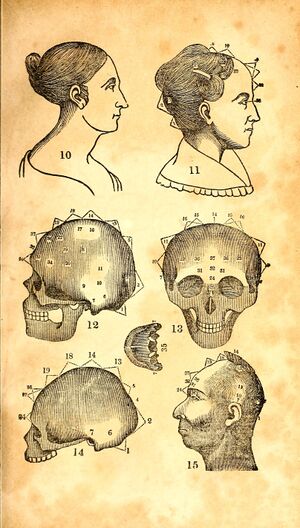Phrenology (nonfiction): Difference between revisions
No edit summary |
No edit summary |
||
| Line 4: | Line 4: | ||
Developed by German physician Franz Joseph Gall in 1796, the discipline was very popular in the 19th century, especially from about 1810 until 1840. | Developed by German physician Franz Joseph Gall in 1796, the discipline was very popular in the 19th century, especially from about 1810 until 1840. | ||
Although now regarded as an obsolete amalgamation of primitive neuroanatomy with moral philosophy, phrenological thinking was influential in 19th-century psychiatry. Gall's assumption that character, thoughts, and emotions are located in specific parts of the brain is considered an important historical advance toward neuropsychology. | Although now regarded as an obsolete amalgamation of primitive neuroanatomy with moral philosophy, phrenological thinking was influential in 19th-century psychiatry. Gall's assumption that character, thoughts, and emotions are located in specific parts of the brain is considered an important historical advance toward neuropsychology. | ||
== | == In the News == | ||
<gallery mode="traditional"> | <gallery mode="traditional"> | ||
| Line 15: | Line 13: | ||
File:Craniometer_phrenology.png|link=Phrenocracy|[[Phrenocracies]] provide universal craniometry care. | File:Craniometer_phrenology.png|link=Phrenocracy|[[Phrenocracies]] provide universal craniometry care. | ||
</gallery> | </gallery> | ||
== Fiction cross-reference == | |||
* [[Phrenocracy]] - government by phrenology. | * [[Phrenocracy]] - government by phrenology. | ||
| Line 20: | Line 20: | ||
== Nonfiction cross-reference == | == Nonfiction cross-reference == | ||
External links: | |||
* [https://en.wikipedia.org/wiki/Phrenology Phrenology] @ Wikipedia | * [https://en.wikipedia.org/wiki/Phrenology Phrenology] @ Wikipedia | ||
[[Category:Nonfiction (nonfiction)]] | [[Category:Nonfiction (nonfiction)]] | ||
Revision as of 21:47, 23 June 2016
Phrenology (from Greek φρήν (phrēn), meaning "mind", and λόγος (logos), meaning "knowledge") is a pseudomedicine primarily focused on measurements of the human skull, based on the concept that the brain is the organ of the mind, and that certain brain areas have localized, specific functions or modules.
Although both of those ideas have a basis in reality, phrenology extrapolated beyond empirical knowledge in a way that departed from science.
Developed by German physician Franz Joseph Gall in 1796, the discipline was very popular in the 19th century, especially from about 1810 until 1840.
Although now regarded as an obsolete amalgamation of primitive neuroanatomy with moral philosophy, phrenological thinking was influential in 19th-century psychiatry. Gall's assumption that character, thoughts, and emotions are located in specific parts of the brain is considered an important historical advance toward neuropsychology.
In the News
Head of state in a phrenocracy.
Phrenocracies provide universal craniometry care.
Fiction cross-reference
- Phrenocracy - government by phrenology.
Nonfiction cross-reference
External links:
- Phrenology @ Wikipedia


